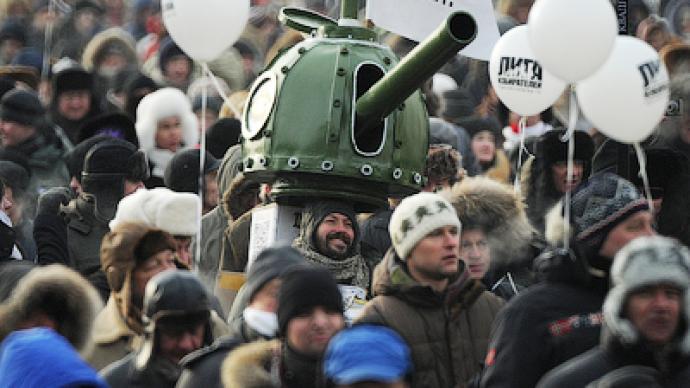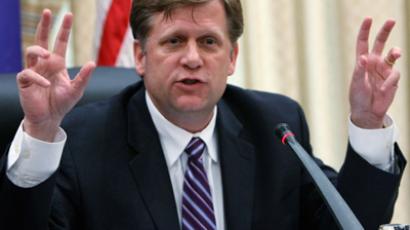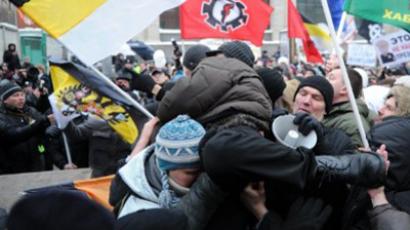McFaul and the Moscow opposition rallies

The February 4 rally to support PM Vladimir Putin officially drew four times as many people as the opposition rally. Writer and political scientist Igor Panarin believes that was the first failure of US ambassador to Russia Michael McFaul.
In the article below, professor Igor Panarin explains his view.Michael McFaul first visited Russia during Perestroika. Later, in the early 1990s, McFaul headed the Moscow office of the National Endowment for Democracy, the main financing hub of the Russian liberal opposition. McFaul, therefore, has known Russian liberal grant receivers for quite a long time. McFaul, an employee of both the Freeman Spogli Institute for International Studies and Stanford’s Hoover Institution, then went on to take part in collective theory-building behind the British-American project to democratize Ukraine and summarize the experience of destabilizing the country. He was among the editors of the 2006 book “Revolution in Orange: The Origins of Ukraine's Democratic Breakthrough.” After the success in Ukraine, the British lobby in the US (Madeleine Albright and Hillary Clinton) ordered McFaul to turn to Russia, looking for people who behaved similarly to Yulia Tymoshenko and Viktor Yushchenko. Ultimately, he found Aleksey Navalny and Maria Gaidar (the daughter of Yegor Gaidar, the “father” of Russian liberal reforms of the early 1990s). Aleksey Navalny, a shy young man with a bit of a personality split, was no celebrity in 2006. However, by 2011 he became Russia’s most popular blogger and a charismatic public activist. Where did this unstable young man, suffering from a Napoleonic complex, find the money to finance his movement? Well, McFaul is a professional. He never fails to pick the right people. In 2006, the project “Da!” initiated by Navalny and Gaidar, started receiving donations from the National Endowment for Democracy (McFaul is still on the NED’s board of directors). As part of the program to initiate an “orange coup” in Russia, McFaul sent Navalny to study at the Yale University as part of the Yale World Fellows program in 2010.After a thorough comparison of the psychoanalytical portrait (apparently, for reflexive governance purposes) of a Russian Viktor Yushchenko, huge foreign grants were opened. Therefore, the author of the Aleksey Navalny project is none other than Michael McFaul. Maria Gaidar has temporarily fell out of the race (went to study in the United States) after a major scandal in Kirov surrounding her name (Maria Gaidar was allegedly involved in a car crash causing the death of a 13-year-old girl).Immediately after his arrival in Moscow on January 14, Michael McFaul got down to business very actively. He carried out several meetings with opposition leaders (January 17 and 22), addressed the public live on Echo of Moscow radio – a media stronghold of the Russian liberals. Then on January 25 he gave an interview to the influential Kommersant newspaper, and on January 30 he participated in Vladimir Pozner’s TV show on nationwide Channel One. Aside from media publicity, he started working thoroughly on making anti-Putin rallies in Moscow more creatively (together with the founder of the oppositional Novaya Gazeta, former president of the USSR Mikhail Gorbachev). It seemed that the February 4 rally was bound for success.However, the reshuffle in the Kremlin at the end of December 2011 led to a change in Vladimir Putin's election campaign strategy and the beginning of real counter actions to the anti-Putin information campaign. Also on February 4, despite the freeze of minus 20 degrees Celsius, Poklonnaya Hill saw a huge rally. Though it is even hard to breathe in such cold weather, around 140,000 people gathered together, according to police. And this is a big achievement of the new head of Vladimir Putin’s election campaign Vyacheslav Volodin (First Deputy Head of the Presidential Executive Office). So, McFaul has lost, but he has lost only in the first round of this confrontation. Time has shown that he knows how to withstand pressure, quickly gets adjusted to a changing situation, and he obviously has some secret plans of how to put the Aleksey Navalny project into life. So, it is too early for the Kremlin to relax – the fight to prevent chaos and to preserve the Russian statehood is yet to come.
Prof. Igor Panarin, Doctor of Political Sciences, special to RT
The statements, views and opinions expressed in this article are those of the author and do not necessarily represent those of RT.














